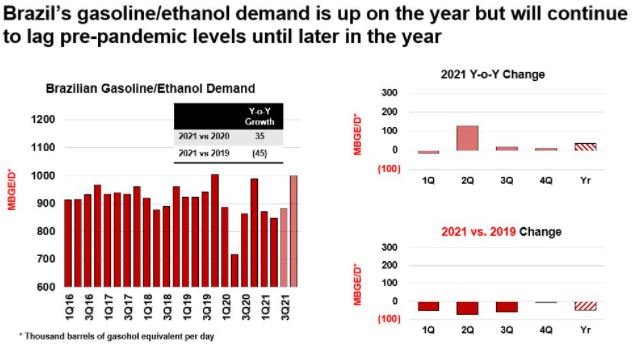Highlights
- Weather disruptions reduce sugarcane harvest in CS Brazil to 10-year low, ethanol output to 4-year low
- S&P Global Platts ethanol price assessment reaches new record high despite peak of the crop
- Reduced E100 demand increases the call on gasoline
- Raizen, Brazil’s largest biofuel producer, raises $1.3 bil to spur growth in advanced biofuels
A version of this Spotlight from S&P Global Platts Analytics was first published August 11.
The Center-South Brazil 2021-22 sugarcane harvest is proving to be one of the most challenging seasons on record. On top of a prolonged drought — the worst in almost a century — the sugarcane crop has been recently impacted by three waves of frost. S&P Global Platts Analytics reduced the cane supply forecast to the lowest in 10 years at 522 million mt. Further cuts are still a possibility in the upcoming weeks, as the frost damage continues to be assessed. Both sugar and ethanol rallied to new record highs on Aug. 10, following a sharp drop on yields.
Platts Analytics forecasts CS Brazil ethanol output to be 460,000 b/d, the lowest since 2017–18, and down 12% on the year. The drop is not more significant thanks to the growth in domestic corn ethanol production. The tight supply, the consequent rise in prices and new consumer patterns following the pandemic have consumers switching away from the biofuel. In June, E100, or hydrous ethanol’s share in total light fuel demand fell to the lowest since April 2018.

One winner from this dynamic has been the refining sector. Year-to-date local crude runs and refined product output is higher year on year. In particular, output of gasoline A, which has no ethanol mixed, is robust, rising 70,000 b/d year on year, and up 10,000 b/d from the same period in 2019. This trend syncs up with the increase in consumption of gasoline C — blended with 27% anhydrous ethanol — which rose about 9% year on year over H1 2021, but was down 4% from the same period in 2019. It is worth pointing out that in June in particular, the trend versus 2019 was reversed with gasoline C demand up 8% — June 2021 versus June 2019. The same trend is observed from an overall spark-ignition perspective, where H1 2021 demand is up 7.1% year on year.

Brazilian ethanol producers must remain committed to ensure there will be sufficient domestic supply for the mandatory blend. Cumulative anhydrous output increased to a new all-time high, up 25% on the year, during the April 1-Aug.1 period. This is, albeit, lower overall ethanol production — down 3% on the year — for the same period. Brazil also imports anhydrous ethanol. Despite a current 20% import tariff on US product, imports are expected to reach 30,000 b/d in the fourth quarter of 2021 and first quarter 2022.
The sharp drop in the sugarcane crop in Brazil this year exposes the fragility and challenges of relying on agricultural products to lower carbon emissions globally. The ongoing expectations for climate adversity to become the new norm should continue to challenge feedstock availability. Brazil’s RenovaBio program mandates fuel distributors to purchase decarbonization credits, which are generated by renewable fuel producers. The country’s largest renewable fuels producer, Raizen — a joint venture between Shell and Cosan — raised $ 1.3 billion in an August IPO. This is expected to allow the company to grow faster and increase its production of second-generation ethanol and biogas.
[ad_2]





